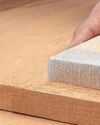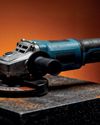MUST-HAVE SAWS FOR THE WORKSHOP AND GARDEN
May/June 2023
|The Home Handyman
There is a huge range of saws for the workshop and garden and some really unique power saws that have recently been introduced for DIY'ers in the workshop and garden.
-

Modern saws make jobs easier, quicker and, in most cases, complete all jobs with the latest innovative equipment more professionally. The latest generation of power saws offer a host of new features compared to their predecessors – they’re easier and cleaner to use, more accurate and make light work of tough jobs. In this guide we explain the difference between some of the most popular types of saws and help you to choose the right saw for the job.
The most common, bestselling and most purchased saw for DIY’ers is the jig saw, followed by the circular saw; these are the two must-haves for general industry, homeowners and DIY’ers. You can do most jobs with these two saws. First time buyers should also look at the new special dual offerings; the multi 2-in-1 jig saws. There are also some special circular saws on offer with special features, so do some homework before you buy.
Key features to look for when choosing a saw:
Length of stroke: This is the distance the saw blade travels up and down. On a jigsaw, for example, a 20mm stroke means the blade will move 20mm down and 20mm up to complete one stroke. The longer the stroke length of the saw, the greater the number of teeth that come into contact with the material in each stroke cycle.
Strokes per minute: The amount of times the blade travels down then up in one minute. The higher the number of strokes per minute, the higher the number of cuts and therefore the faster and more effi cient the machine.
No load speed: The amount of times the blade travels up then down (or the number of complete revolutions for a circular saw) each minute. ‘No load’ refers to the motor speed when the saw isn’t actually cutting (this usually decreases when it is).
هذه القصة من طبعة May/June 2023 من The Home Handyman.
اشترك في Magzter GOLD للوصول إلى آلاف القصص المتميزة المنسقة، وأكثر من 9000 مجلة وصحيفة.
هل أنت مشترك بالفعل؟ تسجيل الدخول
المزيد من القصص من The Home Handyman

The Home Handyman
KEEP YOUR HOUSE CRITTER FREE
With winter fast approaching, outdoor critters seeking to regulate their temperature are trying their best to get inside. Ants, spiders, moths, mosquitoes, fruit flies, stink bugs, termites, silverfish, and ladybugs, to name a few, can easily make their way into homes, and once they've settled in, it's often hard to get them out.
6 mins
Jul/Aug'25

The Home Handyman
SECRET HIDEOUTS
We all have things we would prefer to keep out of plain sight - family heirlooms, wedding rings, expensive jewellery, medicines or even weapons. Sometimes we just want to keep household items hidden in order to declutter a space. Whether you want to hide items for safety or financial reasons, or simply want to keep your bedroom tidy, there are a few clever storage ideas that could help you out.
2 mins
Jul/Aug'25

The Home Handyman
ABRASIVES DEMYSTIFIED
Abrasive materials are indispensable in countless industries, from woodworking and metal fabrication to automotive repair and electronics manufacturing.
3 mins
Jul/Aug'25

The Home Handyman
THINNERS VS. TURPENTINE
If you've ever finished a painting or staining job and been left wondering how best to clean your brushes, you're not alone. One of the most common DIY questions is: Should I use thinners or turpentine to clean my brushes? The answer depends on the type of paint or coating you've used. Using the wrong solvent can damage your brushes, or worse, make the cleaning job even harder.
2 mins
Jul/Aug'25

The Home Handyman
KEEP THE COLD OUT
Did you know that homes in South Africa are either insulated to a poor standard, compared to European nations, or have no form of insulation at all. In 2011 our National Building Regulations made it compulsory to fit thermal insulation in new buildings and additions to building structures.
5 mins
Jul/Aug'25

The Home Handyman
ANGLE GRINDERS — MASTERING THIS VERSATILE TOOL
When it comes to versatile tools in a DIYer's arsenal, few can match the power and practicality of the angle grinder.
2 mins
Jul/Aug'25

The Home Handyman
KITCHEN CARE – MAINTENANCE TIPS FOR KEY AREAS
The kitchen is the heart of the home where meals are made, memories are shared, and chaos sometimes reigns. But like any hardworking space, your kitchen needs regular maintenance to keep it functional, safe, and looking great.
2 mins
Jul/Aug'25

The Home Handyman
Separating Fact from Fiction
Maintaining your home can be a daunting task, especially with the plethora of DIY tips and tricks floating around the internet.
2 mins
Jul/Aug'25

The Home Handyman
SEALANTS SIMPLIFIED: WHAT TO USE AND WHERE
Whether you’re tackling a weekend DIY fix, remodelling your home, or involved in large-scale construction, sealants are a silent hero that play a vital role in creating watertight, airtight, and secure finishes.
3 mins
Jul/Aug'25

The Home Handyman
COMMON FRIDGE/FREEZER FAULTS
Your fridge freezer is one of the hardest-working appliances in your home, so when it stops performing as it should, it can cause major inconvenience. The good news? Not every fault means an expensive call-out or a trip to the shops for a new one. In many cases, you can fix the issue yourself with a little know-how and a few basic tools.
3 mins
Jul/Aug'25
Translate
Change font size

